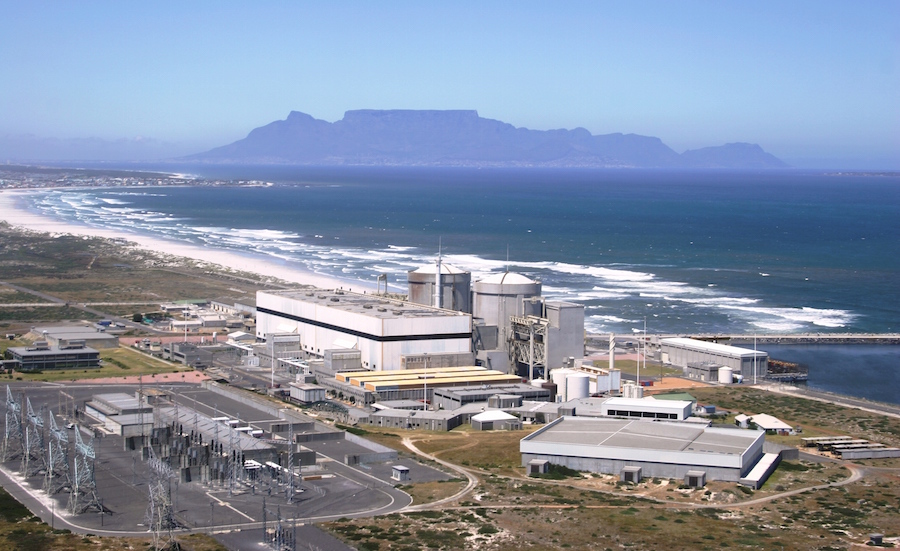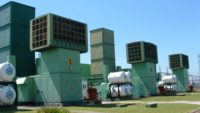U.S. nuclear power company Westinghouse Electric Co.’s Belgian subsidiary Westinghouse Electric Belgium has succeeded in blocking a $315-million South African nuclear plant refit contract that had been awarded earlier to Westinghouse’s French rival Areva.
The South Africa Supreme Court of Appeal (SCA) has directed state-owned power utility Eskom, which awarded the contract for the design, maintenance and installation of six new steam generators at the 1,840 MW Koeberg nuclear power station in August 2014, to “start the tender process again.” The court, however, rejected a plea to substitute Areva with Westinghouse.
Westinghouse claimed Eskom had unfairly picked Areva, the only other bidder, as the winner of the multimillion-dollar contract. The agreement would have required the new steam generators to be in place by 2018. This refit project is part of South Africa’s nuclear construction plan, which targets 9,600 MW of electricity generation from nuclear sources by 2030.
“Eskom should start the tender process again and if it still considers that the criteria it wrongly took into account or to which it attributed double weighting are vital, it should include these amongst the bid evaluation criteria,” said Judge C.H. Lewis.
Westinghouse, which is majority owned by Toshiba Group, had told the court its bid was $8.8 million (Rs 140 million) less than Areva’s and that its supplier development and localization contribution, which was part of the tender criteria, was $9.8 million (Rs 157 million) more than that of its French rival.
After the December 9 ruling Westinghouse said in an emailed response: “In layman’s terms, we won, the appeal was upheld and we were awarded costs, including the costs of counsel.”
Spokesperson Hans Korteweg said the confirmed Eskom’s Board Tender Committee “unlawfully took into account considerations which it was not entitled to take into account.”
"Westinghouse is reviewing the decision by the Supreme Court of Appeal to remit the decision, to award the tender for the provision of six new steam generators at the Koeberg nuclear power plant to Areva, back to Eskom for reconsideration.”
He said the finding that Eskom’s tender committee unlawfully took into account so-called ‘strategic considerations’ “is, however, to be welcomed."
Eskom had appointed a 25-member technical committee to evaluate the Westinghouse and Areva bids in reference to the bid criteria and made recommendations to the power utility’s Executive Procurement Sub-Committee (EXCOPS). The sub-committee in turn made suggestions to the Board Tender Committee, which makes Eskom’s final determination on tenders.
The EXCOPS recommended that although Westinghouse qualified to be awarded the contract, the tender should go to Areva despite its bid being the more costly.
“Had Eskom not taken into account irrelevant considerations, the award would have been made to Westinghouse,” Westinghouse argued.
Eskom said in an emailed response it is reviewing the judgment and that “it would be premature for us to respond to the specific questions relating to this ruling.”
“We are certain though, that we will definitely appeal this judgment,” the power utility said.
The two pressurized water reactors at Koeberg nuclear power station have been in operation since 1984 and 1985 respectively with a lifespan of 30 years. Eskom is implementing the Koeberg Business Plan, which includes extending the lifespan of the plant to 40 years and the refit contract is part of this program.
The existing steam generators at Koeberg, three each for the two units, were supplied by Areva, formerly Framatone, but are now said to be prone to “granular stress corrosion cracking” and need replacement. The nuclear plant, the only one in South Africa, which supplies up to 6% of the country’s national grid capacity, was designed by Westinghouse.
Eskom plans to shut down the plant in phases as the steam generators are replaced in stages up to 2018. Areva commenced implementation of the contract in September 2014 although Judge Lewis said the court “does not know what the consequences of substitution (of the tender) will be and the 2018 deadline is looming.”
AREVA spokesperson Katherine Berezowskyj said the company “notes the court’s decision regarding the Eskom v. Toshiba/Westinghouse case. We will review the terms of the judgment to fully understand the grounds and its consequences.”
In August, Westinghouse CEO Danny Roderick told Bloomberg his company is keen on “good acquisitions and there are parts of Areva I am interested in.”
Areva, which is 85% controlled by government, needs $7.63 billion to “balance its accounts” according to the report. In early November, AREVA announced it had signed a memorandum of understanding with China National Nuclear Corp. (CNNC) “for a possible partnership that includes capitalistic and industrial components.”
The company said the partnership involves “a possible minority stake acquisition by CNNC in AREVA’s capital.”
Meanwhile, in neighboring Zimbabwe, President Robert Mugabe’s cash-strapped government has revived the stalled expansion project of the country’s largest coal-fired Hwange Power Station with financing from China.
China is offering more than $2.174B for the power plant’s revival and expansion, the largest such financial backing for Zimbabwe’s infrastructure sector in 30 years. China Electric Power Construction Group signed a $1.174-billion deal with Zimbabwe state-run Zimbabwe Power Co. during the official State-visit by Chinese President Xi Jinping in early December. Separately, China Export/Import Bank also signed a $1-billion deal for the expansion power plant whose capacity has dropped to 50 MW compared to its nameplate capacity of 920 MW comprising four units of 120MW each and two units of 220 MW each. The new contract will see an addition of two new generating units of 300 MW each.
In October 2014, Zimbabwe Power Co. signed an engineering, procurement and construction contract with Chinese infrastructure firm Sinohydro Corp. for the Hwange Power Station project.
Sinohydro Corp. is also expanding the 750 MW Kariba South Power Station by adding another 300 MW by 2017. China Exim Bank has provided $319 million for the expansion while the rest will be from Zimbabwe Power Co.



Post a comment to this article
Report Abusive Comment